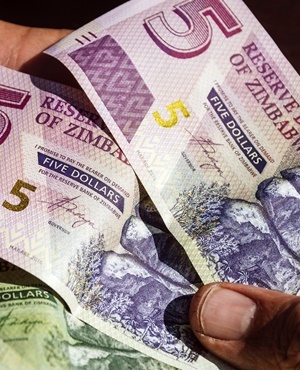
Late in February, Zimbabwe introduced a new currency called the RTGS, or real-time gross settlement dollar, in the process abandoning its long held 1:1 parity between the US dollar and its local transactional instrument - the bond note.
"We have introduced the RTGS dollar. Citizens have to accept the introduction of the RTGS dollar. Whether you like the name or not, it is the domestic currency now - let’s respect it and support it," Finance and Economic Development Minister Mthuli Ncube told a Youth Indaba on Thursday.
But why is Zimbabwe introducing the RTGS dollar?
In 2009, Zimbabwe was forced to adopt a multi-currency system after its local currency was rendered useless by hyperinflation, which surged to an astronomical 231 000 000%, resulting in the Zimbabwean dollar being rejected.
The US dollar then became its anchor currency, while the authorities adopted a multi-currency system which allowed people able to pay in US dollars, rands, bond notes, and mobile money in shops. Though part of the basket of currencies, the Chinese Yuan was rarely used.
READ: Zimbabwe miners to pay 80% wage increase
But with weak exchange rules and a strong appetite for imported products, Zimbabwe soon ran out of US dollars for both local and external transactions.
The central bank, in an effort to ease currency shortages, introduced bond notes in October 2016. Though not legal currency - rather just a financial instrument - they were used for local transactions and initially at par with the US dollar, meaning US$1 was equal to 1 bond note.
The market, however, quickly rejected the bond notes and the surrogacy currency lost value, trading at a huge discount to the US dollar.
Enter the RTGS dollar
With the situation becoming untenable, the Reserve Bank of Zimbabwe, in its 2019 Monetary Policy Statement, finally abandoned the long-held 1:1 parity between local bond notes, including RTGS balances (money held in banks but used through transfers, bank cards or mobile money, if physical notes were unavailable) with the US dollar.
The central bank then introduced the RTGS dollar, which is made up of bond notes and deposits in the bank. No new notes were issued, and there was no announcement that new notes would be introduced.
Notes and bank deposits were combined under the same name to ensure that those using bond notes to transact were charged the same as those doing electronic transactions, for example by using mobile money. In the past, to buy US dollars with bond notes or through a bank transfer, a different rate was used, and to remove that distortion, the central bank decided to introduce the RTGS dollar as a legal tender.
What is the RTGS dollars' relationship with the US dollar, and what has been the reaction so far?
Like any normal market, the relationship or the exchange rate between the US dollar and the RTGS dollar will now be determined by market forces, through what is called an interbank market.
At introduction, on February 22, the exchange rate was RTGS$2.50 for every US$1, and the rate remained there for more than a week. Economic players doubted whether the rate was really floated.
This week, the RTGS dollar has, however, weakened and at mid-morning on Friday, the exchange rate stood at RTGS$2.75 to US$1, a 9.09% drop.
According to the RBZ, all local transactions must be settled in RTGS dollars, putting an end to the multi-tier pricing system. This only applies on paper though, as some shops in the informal sector still display prices in both RTGS dollars and US dollars.
"The RTGS dollars shall be used by all entities (including government) and individuals in Zimbabwe for the purposes of pricing of goods and services, record debts, accounting and settlement of domestic transactions," said the RBZ.




 Publications
Publications
 Partners
Partners











